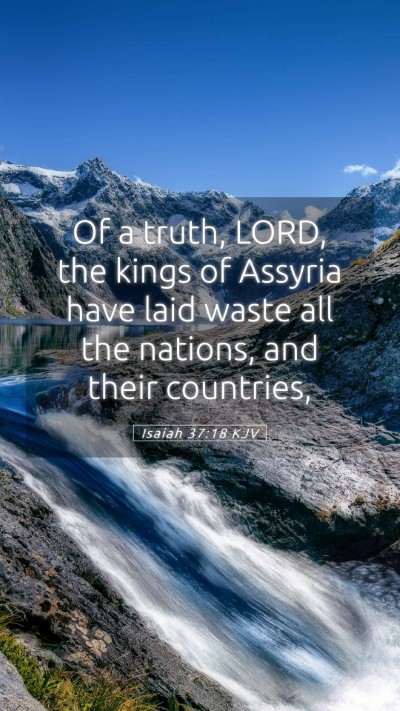Understanding Isaiah 37:18
Isaiah 37:18 states, "Of a truth, O Lord, the kings of Assyria have laid waste all the nations, and their countries." This verse occurs within a larger narrative in which King Hezekiah of Judah seeks assurance and deliverance from the intimidating threat posed by the Assyrian empire led by King Sennacherib, who has already conquered many nations.
Below, we will provide a thorough examination of this verse by combining insights from various public domain commentaries, including those by Matthew Henry, Albert Barnes, and Adam Clarke. This will contribute to a comprehensive understanding of its meaning, context, and application.
Context of Isaiah 37:18
In the context of Isaiah 37, Hezekiah receives a letter from Sennacherib, who boasts of his victories over other countries and challenges the God of Israel. This causes Hezekiah to seek guidance and encouragement through prayer, acknowledging the power of God amidst fear and uncertainty. The historical backdrop of Assyria’s conquests is crucial for understanding this passage.
Insights from Commentaries
-
Matthew Henry emphasizes the contrast between Hezekiah's faithfulness to God and the might of the Assyrian empire. He indicates that recognizing the scope of Assyria's conquests serves as both a current threat and a historical reminder of God’s sovereignty over nations.
-
Albert Barnes points out that the acknowledgment of the Assyrians’ destructive actions was necessary for Hezekiah’s prayer. By recognizing the very real threat posed by Assyria, Hezekiah demonstrates an understanding that goes beyond mere political concern to a spiritual reliance on God’s power.
-
Adam Clarke notes that the phrase reflects a confession of the power of Assyria, but it also sets the stage for God’s miraculous intervention. Clarke elaborates on the idea that recognition of the enemy's power is the first step before God acts, illustrating a profound reliance on divine sovereignty.
Theological Reflections
This verse bears theological significance as it reveals the nature of Israel's God amidst human calamity. It serves to affirm that while nations may rise and conquer, the true king remains sovereign. The lament of Hezekiah resonates with believers who face overwhelming challenges, reminding them to call upon God.
Application to Daily Life
As modern believers reflect on Isaiah 37:18, they can find insights applicable to their own struggles. When faced with formidable obstacles, it is essential to acknowledge the reality of such challenges while placing trust in God’s bigger plan and His ability to deliver us from seemingly insurmountable odds.
Related Bible Cross References
- 2 Kings 19:19: A parallel account of Hezekiah’s prayer for deliverance.
- Isaiah 36:15-18: The taunts of Sennacherib and the threat posed to Jerusalem.
- Psalm 46:1: God is our refuge and strength, a very present help in trouble.
Conclusion
Isaiah 37:18 encapsulates a poignant moment in the history of Israel, emphasizing the acknowledgement of human limitations in the face of divine sovereignty. Through scriptural analysis, we see that understanding this verse provides deep spiritual insight into faith, reliance on God, and the overarching narrative of divine rescue. Such comprehension is invaluable for Bible study groups, personal devotion, or online Bible study, aiding not only in biblical exegesis but in practical applications to daily life.


